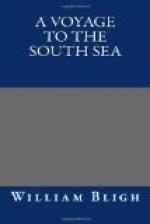John Fryer: Master.
Thomas Ledward: Acting Surgeon.
David Nelson: Botanist.
William Peckover: Gunner.
William Cole: Boatswain.
William Purcell: Carpenter.
William Elphinston: Master’s Mate.
Thomas Hayward, John Hallet: Midshipman.
John Norton, Peter Linkletter: Quarter Masters.
Lawrence Lebogue: Sailmaker.
John Smith, Thomas Hall: Cooks.
George Simpson: Quarter Master’s Mate.
Robert Tinkler: A boy.
Robert Lamb: Butcher.
Mr. Samuel: Clerk.
There remained on board the Bounty:
Fletcher Christian: Master’s Mate.
Peter Haywood, Edward Young, George Stewart:
Midshipmen.
Charles Churchill: Master at Arms.
John Mills: Gunner’s Mate.
James Morrison: Boatswain’s Mate.
Thomas Burkitt, Matthew Quintal, John Sumner, John
Millward, William
McKoy, Henry Hillbrant, Michael Byrne, William Musprat,
Alexander Smith,
John Williams, Thomas Ellison, Isaac Martin, Richard
Skinner, Matthew
Thompson: Able Seamen.
William Brown: Gardener.
Joseph Coleman: Armourer.
Charles Norman: Carpenter’s Mate.
Thomas McIntosh: Carpenter’s Crew.
In all 25 hands, and the most able men of the ship’s company.
Having little or no wind we rowed pretty fast towards Tofoa, which bore north-east about 10 leagues from us. While the ship was in sight she steered to the west-north-west, but I considered this only as a feint; for when we were sent away “Huzza for Otaheite” was frequently heard among the mutineers.
Christian the chief of the mutineers is of a respectable family in the north of England. This was the third voyage he had made with me and, as I found it necessary to keep my ship’s company at three watches, I had given him an order to take charge of the third, his abilities being thoroughly equal to the task; and by this means the master and gunner were not at watch and watch.
Haywood is also of a respectable family in the north of England and a young man of abilities as well as Christian. These two had been objects of my particular regard and attention, and I had taken great pains to instruct them, having entertained hopes that as professional men they would have become a credit to their country.
Young was well recommended and had the look of an able stout seaman: he however fell short of what his appearance promised.
Stewart was a young man of creditable parents in the Orkneys, at which place on the return of the Resolution from the South Seas in 1780 we received so many civilities that on that account only I should gladly have taken him with me but, independent of this recommendation, he was a seaman and had always borne a good character.
Notwithstanding the roughness with which I was treated the remembrance of past kindnesses produced some signs of remorse in Christian. When they were forcing me out of the ship I asked him if this treatment was a proper return for the many instances he had received of my friendship? he appeared disturbed at my question and answered with much emotion: “That, captain Bligh, that is the thing; I am in hell, I am in hell.”




